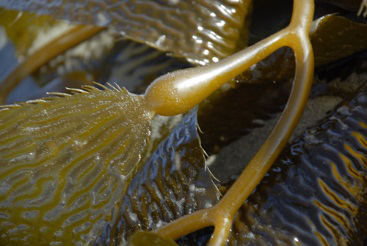Description
Botanical: Macrocystis pyrifera; Laminaria digitata
Other common names: Brown-Green Seaweed, Brown-Green Algae, Horsetail Kelp, Knotted Wrack, Marine Algae, Seaweed, Seawrack, Giant Kelp, Tangle weed, Sugar Wrack, Rockweed
Kelp and other seaweeds are the great gift from the sea. Besides its rich iodine content, which is essential for a healthy thyroid, Kelp has a remarkable supply of vital nutrients, amino acids, vitamins and minerals that are key to promoting healthy overall glandular function. Kelp may even help fight obesity and be useful in weight loss programs.
Country of Origin: Iceland
Beneficial Uses:
Kelp is a thyroid tonic and a rich source of iodine. If this critical element is lacking in the diet, the deficiency may lead to thyroid malfunction, causing an under-active (or overactive) thyroid gland. Kelp nourishes the thyroid gland and so maintains healthy metabolism and glandular function.
When obesity is a direct result of thyroid disorders, Kelp may be of some help in weight control by boosting the thyroid's metabolism. There have been some reports that Kelp has also been effective when used to reduce cellulite deposits. Because of its high iodine content, many nutritionists assume that by stimulating thyroid function, Kelp will increase metabolism and the rate at which the body uses energy and consequently decreases fat deposits
Kelp promotes a healthy-functioning and balanced system throughout the body, building immunity and generally improving glandular functions overall (also aiding digestion and respiration). Moreover, some Japanese studies have shown a direct relationship between ingestion of the algin contained in Kelp and the prevention of fibrocystic breasts and malignant cells and think that the algin is responsible.
Kelp has been used to soothe the mucous membranes in the respiratory tract, thus reducing catarrh and relieving irritated throat and cough.
With regard to rheumatic pain, elements in Kelp are thought to handle the uric acid that contributes to the pain and eliminate the uric acid from the body. The plant has also been known to help relieve inflamed joints and tissues caused by arthritis and osteoarthritis.
Asian people use Kelp to treat genitourinary tract problems, including kidney, bladder, uterus and prostate. Some older men have reported that daily use has reduced enlarged prostates and painful urination.
Externally, Kelp has moistening qualities that soften skin and promote circulation, giving a healthy glow when used in a bath.
Kelp's rich supply of nutrients and ability to balance and strengthen overall bodily function helps to promote healthy growth of hair, skin and nails.
Contraindications:
Those suffering from hyperthyroidism or have heart problems should not use Kelp Herbal Supplement. Those with high blood pressure or blood vessel disease should not use this product without first consulting a physician. Pregnant and nursing women should never take Kelp; the Laminaria genus is a uterine stimulant and can dilate the cervix and induce abortion. Kelp should not be taken in large doses (many times the recommended amount), as it may increase pulse rate, cause tremors, acne, elevated blood pressure, hyperthyroidism and counterproductive thyroid function (ironically, there have been reports of an occasional side effect called "iodine goiter" associated with iodine that results in an enlargement of the thyroid gland resembling goiter, and if you experience this, discontinue using iodine, and consult your health care practitioner.
Do not take Kelp without talking to your doctor first if you are taking thyroid hormone medicine - examples: levothyroxine (Synthroid®, Levothroid®), desiccated thyroid (Armour® Thyroid). Rare problems with blood (such as low platelets or bleeding) and low blood pressure have been reported with the use of Kelp; speak with your doctor if you are taking blood thinning medication.


